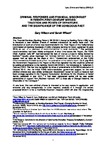Criminal Responses and Financial Misconduct in Twenty-first Century Britain: tradition and points of departure, and the significance of the conscious past
| dc.contributor.author | Wilson, Gary | |
| dc.contributor.author | Wilson, Sarah | |
| dc.date.accessioned | 2017-03-20T15:44:53Z | |
| dc.date.accessioned | 2017-04-11T08:47:22Z | |
| dc.date.available | 2017-03-20T15:44:53Z | |
| dc.date.available | 2017-04-11T08:47:22Z | |
| dc.date.issued | 2013 | |
| dc.identifier.citation |
Wilson, G. and Wilson, S. (2013) 'Criminal Responses and Financial Misconduct in Twenty-first Century Britain: tradition and points of departure, and the significance of the conscious past', Law, Crime and History, 3(3), pp.1-24. Available at: https://pearl.plymouth.ac.uk/handle/10026.1/8888 | en_US |
| dc.identifier.issn | 2045-9238 | |
| dc.identifier.uri | http://hdl.handle.net/10026.1/8888 | |
| dc.description.abstract |
The Financial Services (Banking Reform) Bill 2013/14 (hereafter Banking Reform Bill) is set to introduce a new criminal offence of reckless misconduct by senior bank staff. The introduction of such an offence was recommended in the Final Report of the Parliamentary Commission on Banking Standards (PCBS) Changing Banking for Good, published 19 June 2013; as part of a ‘package of recommendations to raise standards’. This particular recommendation had been widely anticipated. A short time before this Report, the PCBS Chair, Andrew Tyrie MP, had bemoaned the lack of ‘orange jumpsuits’ being donned by bankers. Equally, press reportage that ‘reckless bankers’ could ‘face jail’ had started to appear from as early as the close of 2011. 4 Government endorsement of the PCBS recommendations followed quickly from the publication of the latter’s report. On 8 July 2013 the Government Response to the Report to this effect signalled that this would be achieved by adding amendments to the Banking Reform Bill 2013/14, first introduced in Parliament 4 February 2013. This has now transpired, by virtue of amendments to the Bill introduced on 9 October 2013. Like the initial PCBS recommendation, government support for the new criminal offence was also widely anticipated. Government favour for such a measure had been strongly signalled in the Treasury Consultation Sanctions for the Directors of Failed Banks, published in July 2012. It had been signposted earlier still by very public declarations of support from Matthew Hancock, MP, a close ally of George Osborne, the Chancellor of the Exchequer. At one level, this new criminal offence is intended to be very narrow in application, and enforced only very exceptionally. In other respects, analysis of it through the current proposals show it to be a manifestly important measure which will alter the longstanding course of criminal liability for ‘financial sector’ crime in Britain. It is also part of the discourse of the post-crisis regulatory environment encouraging reflection on the past in configuring responses for the future; including suggestions that too little attention has been paid to ‘lessons of history’. In exploring aspects of both these distinctive angles, attention is paid to how nineteenth-century responses were themselves informed by contemporary Victorian understanding of a ‘conscious past’. Little work has been undertaken on how Victorian responses to financial crime were influenced by a conscious past and the article considers why the introduction of the reckless conduct in banking offence creates such an appropriate juncture for doing so. This is in the light of our own awareness of how criminal law has responded to financial misconduct for over 150 years, and what new approaches might be required to respond to the regulatory challenges of the early twenty-first century. | en_US |
| dc.language.iso | en | en_US |
| dc.publisher | University of Plymouth | |
| dc.rights | Attribution 4.0 International (CC BY 4.0) | * |
| dc.rights.uri | https://creativecommons.org/licenses/by/4.0/ | * |
| dc.subject | Banking sector reform | en_US |
| dc.subject | criminal liability for misconduct in banking | en_US |
| dc.subject | financial sector crime | en_US |
| dc.subject | criminal law | en_US |
| dc.subject | history and the Victorian legacy | en_US |
| dc.title | Criminal Responses and Financial Misconduct in Twenty-first Century Britain: tradition and points of departure, and the significance of the conscious past | en_US |
| dc.type | Article | en_US |
| dc.type | Article | |
| plymouth.issue | 3 | |
| plymouth.volume | 3 | |
| plymouth.journal | SOLON Law, Crime and History |



